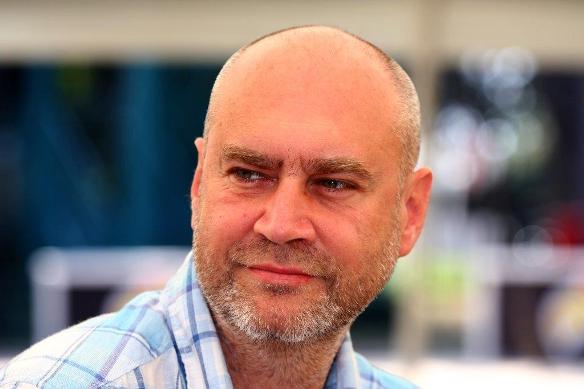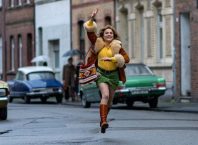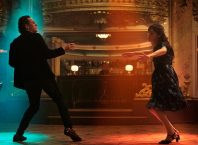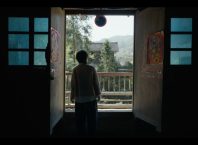The movie screen is utterly black, a dark so deep it cannot be fathomed, the silence offers no sense of what might be out there, what is to come. One can only imagine. Director Andrzej Jakimowski’s film Imagine opens with this evocative scene. The dark silence lasts for only a few seconds, but its impact is immediate and profound. I could feel it on my skin. Facing a black screen occasionally punctuated by the opening credits, the sound of birds chirping can soon be heard, coming in closer, followed by a dog’s panting breath. Light slowly fills the screen with blurred images. Somehow, it felt like morning, the beginning of a new day.

“I wanted to inspire the film with blind people’s way of perceiving reality,” said Jakimowski, “and it’s not only sound. For example, blind people say that when someone enters a room, we don’t need to hear because we feel the fresh air. It’s very poetic.”
Jakimowski is the guest of the Haifa International Film Festival 2012, with his most recent film Imagine, which participates in the Fedeora Competition. The Polish director returns to the festival for the second time, following the screening of his second feature Tricks (2007) at the festival in 2008. Like a sudden burst of sound in a dark room, Ian (Edward Hogg) comes into the lives of a group of blind children living in a special clinic in Lisbon to teach them spatial orientation. Refusing to admit any limitations, Ian walks freely without a cane, and encourages the children to explore and become acquainted with their surroundings through a heightened awareness of sound and the use of echolocation. Most of all, he urges the children to use their minds and imaginations to envision the world in which they live.
Jakimowski discussed the film’s development and approach in an interview with Midnight East.
“It was complicated,” said Jakimowski, “because first I wrote the script with a hero who is blind and who is kind of echolocating – and it was completely invented because I was not aware of the existence of such phenomenon among blind people. Then I read an article about Ben Underwood, a blind black boy. It was a shock for me that such a person really existed. He is not living anymore, he died. Then I had to write the script again, so many things went into rubbish, and I adapted many facts from this research while writing the script. For example tongue clicking is something I didn’t know and I gave Ian the ability of tongue clicking. Previously he was only snapping his fingers. The more I read about blind people’s spatial orientation the more it became fascinating for me and it’s fascinating up to now.”
“Then I started to look for people who would be able to teach me something. Knowing that such a person must exist in Poland I found Henryk Wereda, a completely blind person who is teaching other blind people, mostly children how to move in the space, a spatial orientation instructor. He uses, for example, the clinking of keys. I also found a Spanish man, Alejandro Navas, who used to live in Poland at that time, also echolocating, and I learned a lot from them. Alejandro came to London and stayed for some time and the trained Edward how to move. He was not only learning how to echolocate, he started to echolocate, he was not able to echolocate properly but he started to catch how it works, but also he observed Alejandro – how he should behave. Because this kind of behavior in tiny details reflects how blind people behave.”
“It was shocking for me because most people who have nothing in common with blind society imagine blind people behaving in a certain way because they observe it in film, but this isn’t true. For example blind people react to sound by moving their face, that is how Edward behaves, he is always turning toward the direction of sound, and this is the normal reaction. In films you see blind people stay this way [Jakimowski demonstrated the typical portrayal of a blind person in a film, sitting still and upright] without paying attention to the direction of the sound this is not how it looks like ….One of the main actors, Melchior Derouet (Cyrano), he is completely blind so his behavior on the set is absolutely natural, this is his normal way of behaving. He never liked an artificial behavior. The behavior of the other blind people was a challenge for Edward and Alex (Alexandra Maria Lara who plays Eva) to match and behave the same way, otherwise we would see how much they differ.”
Casting the film became part of Jakominski’s research process as he searched for blind actors in different countries, each with a different social, economic and educational context. “In Poland they used to say that they don’t know what is echolocation, but then they remember that they did something like that when they were children. One man told us: ‘I used to do something like that when I was a child but then a teacher in the school told me not to do that, to stop it because I looked like I was mentally disturbed so I stopped.’ While casting in Portugal we were not looking for echolocating people but two of the kids, Antonio and Tiago, were spontaneously and naturally echolocating so what you see in the film was not trained in any way it was their way of doing it naturally, using tongue clicking.”

The children in the film are played by a wonderful group of non-professionals from different countries, and several languages are heard in the film, although the main language is English. The international aspect of the cast was influenced in part by necessity, depending on where Jakimowski found children who suited the film.
“The most difficult was to find children who would be able to take part in the shoot because it is tiring it takes time,” explained Jakimoski, “For people who cannot take part actively easily this is a challenge. It happened that we found kids who were somehow acquainted with the stage and with public speaking in England, maybe this is because they have formed their own amateur theatre and they are used to being onstage in front of an audience. So we formed the main core from the English kids who were so cute and so brilliant and conscious of what we were doing. All these children became friends, and they stay on facebook and follow what happens with the film. I think blind people are often very clever – they have to cope with the disability with their mind and this is why they are so cute.”
“I like that that this is an international group of people because then they are not they cannot form a group which behaves in one way. I wanted to have various ways of behavior. We wanted something more universal, we didn’t want to concentrate on one group of children because then it would become more specific to a certain country and the specific problems of one country. Because each country has a different way of treating blind people and some of them are more civilized and some of them are less, some of them are rich some of them are poor and all this influences the blind people’s behavior. In France for example there are a lot of programs and people know a lot about recent discoveries and gadgets and in some countries people know less or there is less money.”
When asked about the practical aspects of shooting a film with an international cast composed primarily of children, Jakimowski, who has worked with children in his previous films as well, smiled, “It’s a nightmare…when you’re shooting for example under the roof it’s better but we should under the sky and shooting is all the time waiting and waiting and waiting, and when we are ready to shoot with most of them then some of them want to get out to go to the toilet. When one comes back another one wants to go or someone starts to cry because of the pressure. Having them all together in front of the camera was very difficult. It was the biggest stress I have ever had, I did not expect it would be so difficult. Each person needed to have an umbrella against the sun – English kids cannot stand the Portuguese sun – so we had to have umbrellas on the set. Blind people suffer a lot from the noise on the set because on the set there is a lot of shouting, people moving equipment, people going in all directions and there is a mess. So blind children suffer from this a lot because this is distracting and upsetting so we had to protect them and it’s extremely difficult. But they immediately got what is going on, on the set and I think they contributed to the film a lot. I think they have inspired many situations.”
The children’s performance in the film has a very natural, unaffected feel that makes the film’s impact all the more powerful. “The children did not get the script,” said Jakimowski, “they only got the information which they need. I am not sure they would like to read the script….[during the shooting] they hear everything – they hear the dialogue, they hear what we talk about. For example, if they have to say what they hear when they speak about the person who is walking I did not shoot this as a scene. I put real question marks – what do you really hear? and I make some sounds for them so they could hear. The question was real for them and they gave real answers, so we were not cheating. It was easier for me to improvise then instruct them to do that.”
Although there were many constraints and difficulties, some of the exigencies perhaps enhanced the film’s sense of integrity and spontaneity. “We were lucky,” said Jakimowski, “We could not make rehearsals with the blind kids from England. They were let out of England for only ten days total, including their flight in and out – no time for rehearsals. We simply jumped into the shoot and if something was not working we could not help it.”
While Edward Hogg and Alexandra Maria Lara who plays Eva, the reclusive adult resident of the clinic, intrigued by the new teacher, are sighted actors who were trained to portray blind people, Melchior Derouet is a blind professional actor who has appeared in several films. “What I like in his acting,” said Jakimowski, “is that like most blind people he is not able to see the expression on his face, he is not able to control it, so the expression of blind people is often exaggerated, it’s a bit stronger, and that’s what happened with Cyrano. Some people could think its artificial, but he is behaving in a natural way for blind people who do not control their face so well as we do. We see our faces in the mirror and we see the reaction in the eyes of other people and for blind people it’s impossible. They have to somehow send the message into the darkness with no feedback, and they often are not able to control each detail. They very often act stronger but I like that in his acting.”
Jakimowski found Edward Hogg through his co-producer Mike Downey’s recommendation, and said of the actor, “He can create a role with very deep approach, he becomes the character and in order to do so he really devotes himself. It’s not only work but also attitude. For me Edward became somehow the ideal cast. The same with Alex, she was perfect – her charm and also her master acting. She is a very talented actress, she concentrates very much on what she is doing and I like this attitude.”
Asked about audience responses to the film, Jakimowski replied, “Echolocation the term which attracts the attention of most people because not everyone knows about it, but for me this is not only echlocation….for me it’s much more important – and this is like it was with Ben Underwood – that they are tough and brave somehow to cope against difficulties which would seem impossible to tackle. With this attitude you very often fall down and it meant nothing for him, he just stood up and continued, and this is so beautiful. I like this attitude. Imagine… and I think that’s why we decided on this title, because they really – Ben and other blind people – they really need to use their minds to cope, to understand what is around them and imagination is the main factor, and creative imagination…and sometimes it’s very poetic and I think sighted people can learn from it.”
Ian is a hero who evokes ambivalence with his unusual and daring approach to life, leading to clashes with authority and at some point even the children wonder whether they should follow this Pied Piper of a man. He’s a hero who falls, a hero who gets hurt, who is not immune to danger. Ian remains an enigmatic figure throughout the film, and the film is imbued with a sense of mystery, leaving a lot of room for uncertainty and doubt.
“It was the only position we could take” said Jakimowski, “because the older I am the more I am sure that we don’t know a lot. Most things we question, we only can guess or deduct … we can be convinced but we cannot be sure. So this uncertainty is the main thing for blind and for sighted people and that’s why I tell this story. It’s easier for sighted people to understand their own position when they look on blind.”
Imagine (Poland/France/Portugal 2012 105 min, English)





